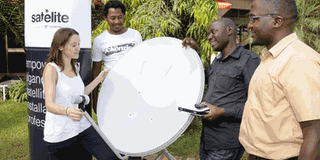Prime
Competition in pay Tv market to stiffen as new player joins

The Azam Tv country manager, Mr Simon Arineitwe (second right), listens to Ms Emma Wright, a trainer from Eutelsat (Left) as trainees look on. PHOTO BY FARIDAH KULABAKO
What you need to know:
Handful. Pay Television subscribers in Uganda are estimated at just 90,000.
Kampala.
Competition among pay television (Tv) service providers is set to stiffen ahead of the June 2015 digital migration deadline, following the entrance of a new player – Azam Tv.
The market, which had about four operators including Dstv, GOtv, Zuku and StarTimes, has attracted Tanzanian-based Azam Tv , a subsidiary of Bakkhressa Group of Companies, that launched in Uganda last week.
With a number of pay Tv subscribers estimated at about 90,000, Dstv, Zuku and StarTimes have been fiercely competing by offering price cuts among other incentives to retain old customers and attract new ones.
Low pay TV penetration
The competition is expected to be even stiffer as companies struggle to attract Tv owners that are still using analogue technology.
The low penetration of pay Tv services is attributed to the high installation and Set Top Boxes (decoders) costs, which are deterrent, especially for the poor communities.
For instance, the initial charges for installing a pay Tv that uses a dish range between Shs120,000 and Shs300,000 depending on the service provider while the Digital Terrestrial Transmission (antenna powered) service providers charge between Shs65,000 and Shs80,000.
This is too high for most Ugandans, whose average monthly income is Shs223,000, according to the Uganda Bureau of Statistics 2012/13 Uganda National Household Survey report.
According to Mr Simon Arineitwe, the Azam Tv country general manager, Set Top Boxes need to be as cheap as possible because they serve as cardinal stepping stones for the public to migrate from analogue to digital broadcasting.
Digital migration rollout
The Uganda Communications Commission executive director, Eng Godfrey Mutabazi, recently said government will roll out digital migration by December 2014, a move that will require broadcasters to shut down their analogue TV transmitters and adopt digital Tv signals.
“By December 31, 2014, Uganda should have achieved foot prints of digital migration,” Mr Mutabazi was quoted saying.
“The purpose is to mitigate any challenges that may arise before June 2015 which is the recommended deadline globally,” he argued.
Digital migration seeks to offer television viewers better quality pictures, improved TV reception signals, and also free the spectrum for other users among others.
The tax waivers
Mr Simon Arineitwe, the Azam Tv country general manager said government needs to intervene again by offering more tax waivers on the devices in addition to the 25 per cent import duty waiver announced during the recent national budget.
Players now pay 6 per cent withholding tax and the 18 per cent Value Added Tax, which they still consider as deterrent for more people to afford pay TV services.




